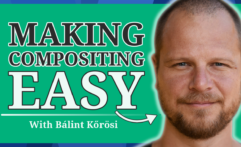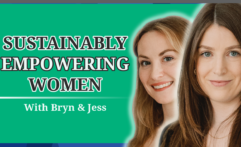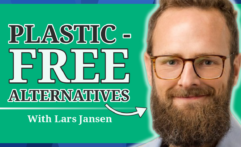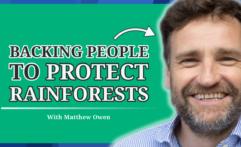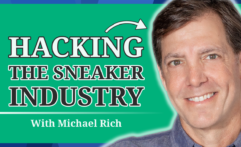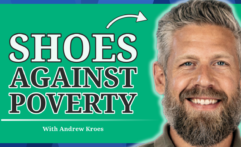Dennis: Hello and welcome to the Impactful Ninja Show. I’m your host, Dennis Kamprad. And today we’re joined by Marley Alles from rax. Marley, welcome.
Marley: Thank you so much for having me. I’m so excited.
Dennis: Thanks for being here. I’m super excited as well. Before we get into your journey, give us a big overview of what is rax. What are you doing there?
Marley: Yeah, so rax is Canada’s PeerToPeer border rental app. So how it works is lenders can make money off their closet by lending out items to borrowers who rent of items for a fraction of the cost of retail value. So really our mission is to tackle the global fast fashion crisis that really profits off worker exploitation and negative environmental impacts.
Dennis: So does that mean that if I’m looking for a specific piece of clothing, instead of having to buy it, I could just use your app and have a look? If there’s something available for me or for anyone else looking, rent it, return it, and I’m not contributing to clothing waste.
Marley: Exactly. Yeah.
Dennis: Sweet. I love it. Now let’s rewind a little bit and get started with your journey, which will then eventually lead us to rax as well. Again, tell me a little bit about your background. What did you do before starting it?
Marley: Yeah, so I was actually working full time at a big four and doing my MBA in technology. So, yeah, I was just working kind of full time in marketing before I started rax.
Dennis: Oh, nice. And from the experience there. So basically working at the big four company, doing the MBA, and then what happened along the journey that you figured out? Like, well, clothing is an issue. The waste, especially with that is an issue. And maybe using items just a few times. What happened along the journey from your professional career to, well, seeing these issues.
Marley: I’ve always really been interested in kind of like entrepreneurship and startups. Really read like, every business book or listened to every podcast. Even at university, I was a teaching assistant for a digital marketing course where students actually had to create a store on shopify and sell real products. So I was kind of like my first taste of entrepreneurship, and that kind of led to me consulting for other companies in the area and then went into marketing, where I learned to grow companies. And then I always kind of had kind of a background of wanting to start a company, but just never had a good idea for it. So I guess how I started rax, or like the idea of clothing rental is I was looking for a dress to wear to a friend’s wedding and really didn’t want to spend a couple hundred dollars on something I knew I was going to wear once. So I looked to clothing rental boutiques because there’s some boutiques around me where they rent out their inventory, so they own it like a brick and mortar location. But I just found the styles were kind of outdated and if I wanted to rent something, I’ve kind of already worn the ones that I wanted to rent. So I just borrowed us from a friend and then thought, like, how could this be done on a larger scale? We all have a closet full of clothes we never wear, like event pieces or the super trendy pieces that go out of style in like a month. And on the flip side, consumer preferences have been changing towards access versus ownership. So we’ve seen it with like Uber Airbnb Spotify, that sharing economy and how people often want a taste of something but not to own it. So yeah, just kind of like the market was moving towards that as well as sustainability and people wanting to be more sustainable, especially with fashion.
Dennis: Sweet. So basically you always had the background of wanting to start something yourself and instead of trying to create a solution and search for a problem, you actually encountered a real problem. You wanted to have a more sustainable wardrobe yourself.
Marley: Yeah.
Dennis: You figured out the solutions out there were just not up to date anymore. You saw the same thing happening in so many different industries where the peer to pee Lending Renting model was quite fine, but it just hasn’t come yet to the fashion industry.
Marley: Exactly. The fashion industry just tends to be legacy industry. There’s still so many brick and mortar locations. It took a while for them to get online. Right. And it’s just really expensive. They’re not following those, changing some preferences. So yeah, wanted to start rax.
Dennis: Nice. And then when you basically did this Rex model together with your friends and kind of Lending Renting clothes from different friend groups to have a look at the workshops from each other, what were the concrete next steps to actually get Rex started?
Marley: Yeah, that was the hardest part. I mean, I feel like we’re always talking with our friends and probably anyone can imagine themselves in a spot where you’re like, oh, that’s such a good idea, we should start that. And then it just never happens. Right?
Dennis: Yeah.
Marley: So for me, I kind of took a more cautious approach and I did all my research on the market to see if it was a viable market opportunity, if it was a growing industry, different competitors in Canada and globally. And if I wasn’t going to do it, how could I be marginally better so it would actually succeed or different or different branding. Look to the future consumer. Is this something that people are likely to buy in on the next like five to ten years or is it just a fad? Definitely spent, like, months and months researching the idea to really validate and then talked to every single person that I could, whether it be friends, family, people in the industry, reached out to random people, and surprisingly, they were really willing to talk to me about it and then just developed kind of a plan of next steps I had to take. And it’s definitely really overwhelming because when you first have the idea, it’s like launching an app that’s really overwhelming. But if you can just do the next thing, the next thing of reaching out to someone or researching app developers makes it a lot more digestible.
Dennis: You can really see that there is an MBA background coming through here. So basically, just to recap slightly from the idea, the first thing that you did, or one of the first thing was basically market research. You had a look if that’s a growing industry. And luckily for us, everything connected. Sustainability seems to be growing quite a bit at the moment, even though still needs to grow much, much more. And the next thing was actually, well, interviews with potential customers and you received some good feedback there. Plus step of you already mentioned that you have an app plus the steps to researching the app developers.
Marley: Totally.
Dennis: You also mentioned that a few months passed by. What would you say was the rough timeframe between, okay, from the wedding, borrowing clothes for the wedding, to okay, the concrete first steps?
Marley: Definitely. As soon as I had the idea, I was absolutely obsessed and literally couldn’t sleep and spent weeks just like researching. But once I kind of validated that the idea was there, the concrete next step was probably two months until I found a developer that I wanted. And there are a lot of different options. I knew nothing about app development. There are so many different options like low code, no code, which are a lot quicker to market and cheaper, which is really good for an MVP. If you ever have an idea, definitely launch with the leanest MVP possible, cheap, quick to market. You don’t want to be spending like six months, $60,000 to develop a whole app that people might not even want. So my idea was just to really launch a super lean, low code MVP in a couple of months just to get it out there, test the market, and then iterate on customer feedback. So, yeah, to answer your question, it was probably two months from the idea to that next step.
Dennis: And did you do this testing next to a full-time job, or did you already say, “Well, let’s go all in”?
Marley: Yeah, next to a full-time job. I’m actually still working my full-time job as I do rax. And I was doing my MBA at the time as well. And it was a global MBA, one to four a.m., which was I would literally set my alarm for like 12:59, sleep for like 2 hours, and then roll out of bed. You have to go on camera. So I was just like a zombie at 1 a.m.
Dennis: But yeah, wow, that’s some real passion coming through there, setting the alarm from one to four a.m.
Marley: Yeah, there’s a lot.
Dennis: So let’s continue on the journey. So basically, you found some developers, you developed the app. What happened to their clothes? Because in the end, a peer-to-peer clothing model is kind of a two-sided business model, right? You need people to lend the clothes and you need people to rent the clothes. You were providing the interface in the middle. How did you get the first customers from either side on board?
Marley: Yeah, it’s a typical marketplace problem where you have the chicken and the egg, like, do I get supply first or demand?
Dennis: And one is always easier, right?
Marley: Yeah, exactly. So for me, I just got literally all my friends to post items on the app. So by the time I launched, I already had probably close to 100 listings, different sizes, styles. So when people actually came onto the app, once I launched, there was already inventory versus having them come to a blank app. So I definitely wanted to build out the supply side first before formally launching.
Dennis: Yeah, nice. And when you say when you launched and people were coming to your app, what was your kind of customer acquisition strategy in this sense? How did you make people become aware that rax exists?
Marley: I’ve only done organic marketing to start, so I’m still just doing organic. So in the first, I think, like 24 hours, we already had over 100 downloads, which is kind of crazy.
Dennis: Wow.
Marley: Really? Just like I had a launch party with just my friends to celebrate, and they were posting about it. I posted on LinkedIn, social media. I also was building up our social accounts probably like six months before I actually even launched just to let people know what was coming and the different items you can rent. So I already had a waitlist before I even launched. So I definitely recommend building up buzz before you actually launch so that when you launch, you have those users ready to go.
Dennis: Nice. I like it. Sorry? Thinking out all the launching parts before and instead of just saying like, hey, hello world, I have an app and where are you all?
Marley: Yeah, it took a few months to build, right? So in those few months, I was like, might as well just start marketing for it and letting people know what I’m doing.
Dennis: Nice. What would you say were one of the biggest challenges for you along the way until well, basically until where we are?
Marley: Now, I have no experience with app development or technology, really. I mean, I did my MBA in technology, but I feel like learning it in real life is pretty different business.
Dennis: Technology versus IT technology.
Marley: Yeah, totally. So I launched a Lean MVP like I mentioned, and it was using a local platform, and it’s definitely quite laggy and slow. It wasn’t quite what I thought it was going to be. So I think my biggest challenge has been like trying to scale an app that might lag or take a few seconds to load, and then users don’t have the best experience. So the tech has kind of been my issue right now. We actually got on a new CTO to lead the tech side of things. Thank gosh. So I’m not doing that as much anymore. I’m still involved, but not the one leading it anymore. So we’re building out a new coded app, launching hopefully this winter. So my biggest challenge has been just the tech side of things.
Dennis: Awesome. But it sounds also without having any coding or any real tech developing abilities, you are still able to manage in a sense of no code, low code, plus a developer who helps you just building it along the way.
Marley: Yeah, code in Python, React Native now.
Dennis: I think that’s also one really good well learning for the listeners because in the end, there might be a lot of obstacles along the way, but there’s always someone who could help you even for the first iteration, which also comes to the next step. You had like a first Lean MVP or like a first iteration of the application out there, and now it looks like you’ve grown so much that you were able to bring a CTO on board to help you with a fully-fledged coded app.
Marley: Totally. Yeah, the Lean MVP was good to test the market. I mean, I wish it wasn’t laggy and slow and all those issues, but we have users and people giving us good feedback, validating the idea, and now we can go out and really storyboard, wireframe, design, take those six months now to build an app where we already know what consumers want because we’ve gotten all that great feedback. Versus if it took six months at the beginning to build it without all that feedback, we might be building something that people don’t want.
Dennis: Yeah, that’s perfect. One of the biggest challenges a lot of businesses face, a lot of startups face, is that they don’t take user feedback into account. And it seems like you’re doing it all the way before starting, during the start, and now even more. How has the growth been for you so far since when you started until now? Like how much time has passed so far, and how did the application and rax develop?
Marley: It’s been almost, I guess, seven months now, which has flown by, and already onboarding a CTO.
Dennis: Awesome.
Marley: We’ve only done organic marketing, so we haven’t done much paid. And not that I don’t want more users on this app that’s slow and laggy, but you don’t want more users to have a bad experience on it. So I’ve just been doing organic, like building up slowly. And then obviously, we have to do the migration to the new app with all the users. So the growth has been good. We have over 1000 users now, but kind of holding off on that growth until we launch our new app and just kind of doing organically now. And then hopefully, we’ll do more of a push once we launch rax 2.0, I guess, in the winter.
Dennis: Nice. I think that’s also a great transition into kind of having a look into the future. Seven months ago, you started. Now you have more than 1000 users, you have a CTO, you’re building rax 2.0. What are your plans for the future? What’s going to happen afterwards?
Marley: Yeah, there are a lot of opportunities with clothing rental. I mean, last week, Japan Airlines just launched a clothing rental, if you saw that. Yeah, they partnered with one of the biggest clothing manufacturers in Japan. And now what you can actually do if you book a flight with Japan Airlines is you can say what date you’re going, what size you are, and then rent a bunch of clothes, and they’ll actually just send it to your accommodation where you’re staying. So they’re trying to reduce their carbon emissions. So obviously, having fake suitcases on flights increases their carbon emissions. So there are definitely some unique angles around it. One thing that I would really love to do for rax is build out our clothing rental as a service. So a lot of traditional fashion companies are trying to obviously be more sustainable. Clothing purchases are actually down at least 5% year over year. So people aren’t actually buying clothes as much, so they’re trying to find more sustainable ways. And it won’t be a nice-to-have, it’ll be a must-have for fashion companies to reach their certain sustainability goals. So I’d love to power their rental for them, whether it be like lines for rental or just their items, and then leveraging rax app and rax audience, who are obviously really tapped into the rental economy, and power their rental for them and allow them to be more sustainable and kind of close the loop on fashion and be more circular.
Dennis: Awesome. I love that part, especially when everything comes to a circular economy, when you turn one product into using it just a few times, maybe even just once, throwing it away, turning it into a circular product, helping it basically live on.
Marley: Exactly. Because we all have just clothes sitting in our closet. In this closet here, you can kind of see just hundreds, probably of dresses that I’ve really worn once. And it’s just so wasteful, it’s expensive, and I’d love someone else to enjoy them, but I don’t want to sell them, right? Because I might still want to wear them. So clothing rental just gives a new opportunity, especially in the side hustle generation. People want to make money and kind of want to be entrepreneurs. There are some really great success stories of how much money people can make just renting out their clothes.
Dennis: Yeah. Awesome. Let’s just say I would want to rent out my clothes. I happen to live where rax App exists.
Marley: Yeah.
Dennis: What would be my concrete first steps? How could I get on board? How could I support the business model? How can I turn my wardrobe into a more sustainable one?
Marley: So if you want to list your closet, it’s super easy. You just download the app, and you can list an item in just a couple of minutes. So you take a picture of it, fill in details like brand, size, color, where it’s located, so people know how far away it is from them. And then you can block off any dates you want to wear it for. So say you know you’re going to wear it in August to a wedding, you can block it off for that date and then just list it out. And then on the flip side, for borrowing, if you want to borrow an item, there’s kind of like a scroll feed, like Instagram. You can scroll hundreds of listings. You can also filter for size, color, all that great stuff. And then you can click borrow, choose how long you want it for, so maybe you want it for up to six months. We also do long-term rentals, and it’s just tiered pricing. You can choose what day you want it for, and then if it’s nearby, you can do local pickup or Canada Post, our shipping partner, so you can get it shipped nationally as well. Nice.
Dennis: And do I understand it correctly that at the moment you’re operating in Canada only?
Marley: Yeah, just Canada for now, but hopefully once we have a new app, we’ll expand.
Dennis: Awesome. So basically, depending on when I listen to this episode going live, either you would already have the app going a little more globally, or let’s just say I would want to holidays in Canada.
Marley: Exactly.
Dennis: I could basically download your app, select where I will be, when I will be there, and have a look at the wardrobe available for holiday. Similar to the Japanese model.
Marley: Exactly.
Dennis: Nice. I like it. Now let’s reflect a little bit on your journey so far. So for the last seven months, plus all the research time and, well, everything that happened beforehand, how would you say, has rax impacted your personal life? Did you make any different choices? Did you change anything to live more sustainably yourself?
Marley: Totally. I always knew the fashion industry, or just other industries in general, were bad, but I didn’t really realize how bad until I did my own research. So the fashion industry is literally the second-worst industry in the world. And it really opened my eyes up to all the different ways that our consumption impacts. So whether it be the toothbrush you’re using in the morning or the food you’re eating or the clothes you’re wearing, I didn’t realize how much of what we consume impacts not only the environment but also ethically and the people working at those companies. So for me, my personal life, it really just shined a light on all the different ways that we are actually all impacting the environment and people.
Dennis: And from everything that you’ve learned as well, what would be one tip that you would be able to give to our listeners to basically become more impactful in their daily lives?
Marley: I think definitely do your own research and realize what you’re doing, how it’s impacting the world. And regarding clothing rental specifically, definitely do your own research on your daily routine and how what you’re doing is impacting the world. So maybe your plastic toothbrush, you can switch to bamboo, or your polyester sheets can switch to bamboo. It’s one of the most sustainable and renewable sourced materials. Maybe instead of buying stuff in plastic wrapping, go for glass jars. I would say just do your own research on what you’re doing and how you can make these little swaps into your everyday routine. It seems really overwhelming if you just go from an unsustainable life to sustainable, it seems like it’s either all-in or nothing, and it’s not. It’s the small steps you can take every day. And the way it’s actually going to stick is if you can just implement it into your daily routine and opt for a little bit more sustainable things you’re doing. So instead of using parchment paper, maybe it’s silicone baking sheets instead, these little swaps that will actually save you money in the long run. And you’re already doing it, so it’s not like you’re doing anything different, it’s just more sustainable.
Dennis: Sweet. I love it. Basically, having a look at the environment, what kind of products and materials we’re using, and then one by one, slowly thinking about whether there’s a more sustainable alternative. Also keeping in mind that maybe it’s more expensive once you buy it once, but since you were able to reuse it, it might even be cheaper and help the environment.
Marley: Exactly. Yeah.
Dennis: Awesome. Well, thanks so much. It’s been super lovely to hear about your journey and about rax. Wishing you all the best with this, and thanks so much for sharing that with us.
Marley: Thanks so much, I really appreciate it, and thanks for having me on.
Dennis: Sweet. And to everyone listening and joining, thanks so much for that as well. And stay impactful.





